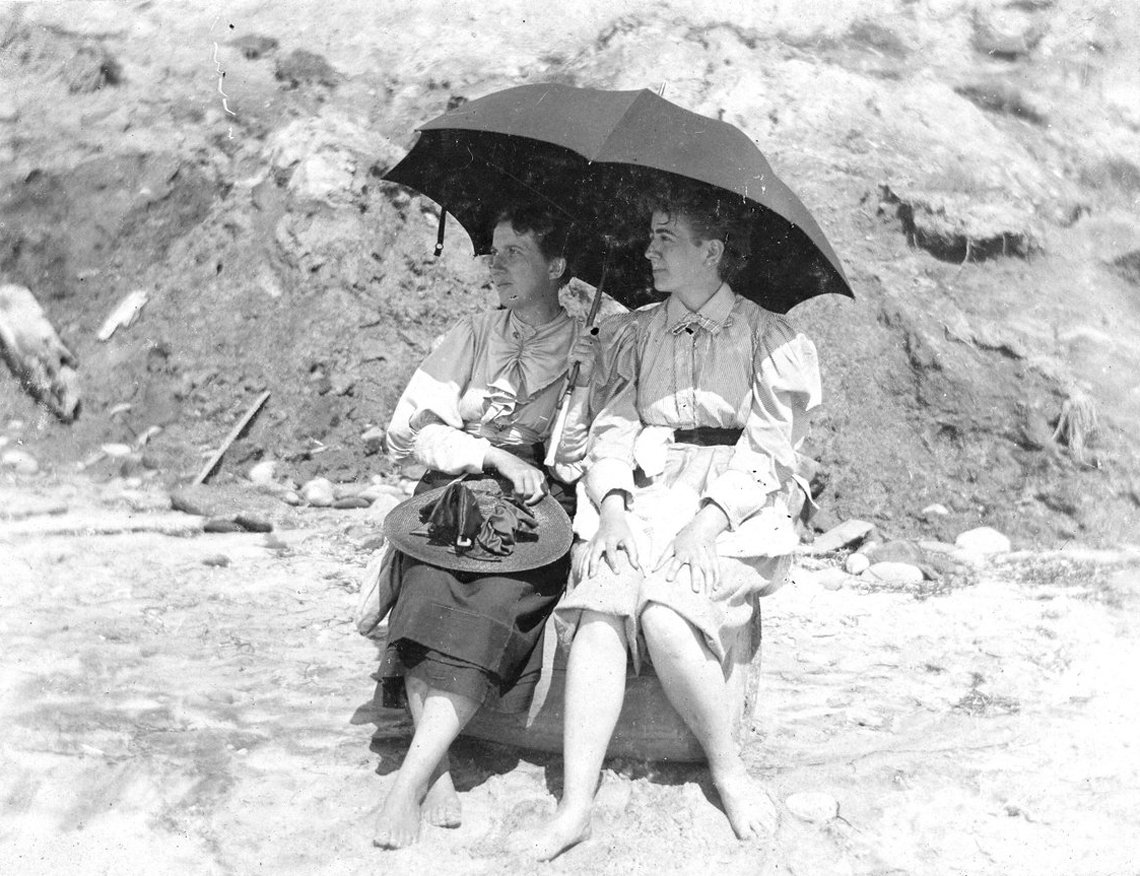Climax isn’t the point
Emily Witt’s ‘Future Sex’ and Sheila Rowbotham’s ‘Rebel Crossings’ approach the concept of free love from different perspectives

Helen Tufts and Helena Born. Image supplied.
Advertisement
From the front page
In the middle of a one-day workshop run by OneTaste, a San Francisco company dedicated to the practice and promotion of orgasmic meditation, participants are required to face each other and ask a question: “What do you desire?”
It is a question, writes American essayist Emily Witt in her new book Future Sex: A New Kind of Free Love (Faber; $29.99), “to which I could only stammer meager responses”. She describes her inability to answer in the terms of an unfulfilled internet search:
I was conscious for the first time of the flat white screen that rolled down when I considered such a question, the opaque shadows of movement behind it. A vacant search bar waited, cursor blinking, for ideas that I, who did not consider an idea an idea until it was expressed in language, had never expressed in language. What I said I desired was to surrender to another person without having to explain what I wanted.
The fatigue that lurks inside Witt’s metaphor may be familiar to anyone who’s ever landed on the Google home page with only a vague notion of their want, whether it be for sex, or new shoes, or a holiday. Potential satisfactions are almost numberless, but how do you arrive at a specific one? Search engines are only really useful when you can narrow down the descriptive terms of the search, and so “What do you desire?” turns out to be a question for which you require some notion of an answer before you have begun to answer it.
Future Sex is Witt’s first book, based in part on previously published essays in the London Review of Books and the American literary journal n+1. It is, for the most, a first-person exploration of various sexual activities available to someone such as herself (“single, straight, and female”, to which one might also add childless and extremely well educated) in our contemporary world. Many of the activities that Witt participates in or sometimes only observes – Tinder dating, live webcams and chat sites, and filmed pornography – are either facilitated or mediated by the internet. The proximity of sex to current and emerging technologies is her theme, but her organising principle is free love, a credo that long predates wireless broadband and smartphones.
At the age of 30, writes Witt in the opening paragraph of her book, “I still envisioned my sexual experience eventually reaching a terminus”. Her unquestioned destination was a monogamous, long-term heterosexual relationship, but, that destination having failed to materialise, she decides instead to begin examining her own presumptions. Like many seekers before her, she heads west across the US, to San Francisco. The city’s long history of alternative communities and its current status as the hub of the global tech industries – Facebook, Google, Apple, Intel and Hewlett-Packard all have their global headquarters in the Bay Area – make it, writes Witt, the place “where the future was going to be figured out”, or if not that, then at least “the city America had designated for people who still believed in free love”.
An incongruous, often incoherent blend of acquisitive capitalism and anti-materialist utopianism is made manifest in contemporary San Francisco, and OneTaste is a good example of the resulting strangeness. It’s a company that behaves like an intentional community, with acolytes of orgasmic meditation making converts by way of steeply priced workshops and coaching sessions. And what is orgasmic meditation, you ask? It doesn’t have much to do with meditation, or even with orgasm as commonly understood; it’s a “partnered consciousness practice” in which a fully clothed person (often male, though not always) stimulates the clitoris of a partially unclothed person, using their hand. After 15 minutes a timer sounds (“usually heralded by the ‘Bell’ setting on an iPhone”, observes Witt) and the “OM” session is over. The two participants exchange verbal notes, called “frames”, about their physical sensations during the session, and then they part ways.
Climax isn’t the point. The practice of orgasmic meditation separates sexual experience “from love and romance”, and even from desire. One can make an online booking to “OM” at the company’s headquarters in the same way that one might schedule a bikini wax or a yoga class, and the crossover customer base between these services is, I imagine, fairly high. It’s clitoral stimulation as self-improvement, or, as the company’s website puts it both more crudely and more grandiosely, “We’re creating change by getting our pussies stroked.”
There’s a kernel of a good idea here, to do with familiarising women with their bodies and their sexual responses, but it comes swaddled in a whole lot of solipsistic bullshit. Witt notes her discomfort with the earnest, questing tone of OneTaste devotees, but in the end she judges them favourably, as people “looking for a method to arrive at a more authentic and stable experience of sexual openness”. The practice of orgasmic meditation could be one solution to the problem of artificial scarcity in the sexual marketplace, whereby women are counselled to withhold sex in favour of love because love might result in the social and economic reward of marriage.
“I believed in the mystique of commitment,” Witt writes of the person she was, before she began her deliberate excursions into sexual practices outside the structure of a relationship. She identifies the 1960s counterculture, which was centred in San Francisco, as “the last moment in living memory” during which a critical mass of Americans tried to live out a “critique of monogamy”. But she also sees the dissipation of that counterculture as the origin point of her own, rather conservative, belief in the superiority of marriage over any other social arrangement. “That was what the 1960s had taught us: not to tamper with the fundamental structures of the family and society.”
“Nonmonogamy”, Witt writes, “adopted en masse and recognized in language and law, would break with history”, and this is true. Our society is based on the aggrandisement of monogamy and marriage – the gradual extension of marriage rights to same-sex couples reinforces rather than challenges this fact – while housework and child-rearing, performed overwhelmingly by women, is an unpaid sphere of labour upon which capitalist economies depend in order to function. But Witt’s book never really touches upon the economic conditions of women’s oppression, nor offers a critique of them. At times Future Sex reads like a degustation menu of sexual options – a dash of bondage sprinkled with voyeurism, or a soupçon of group sex – available to a young, urban and tech-savvy subset of the American bourgeoisie, but an abundance of consumer choice is not the same thing, materially or experientially, as freedom.
There is another history of free love, a term that is often confused, even in Witt’s book, with promiscuity or non-monogamy, though prior to the 1960s counterculture it was not synonymous with either. This current of feminist thought and practice, orientated towards the abolition of marriage and the autonomy of women, is detailed in a new book by the British historian Sheila Rowbotham. Rebel Crossings: New Women, Free Lovers, and Radicals in Britain and the United States (Verso; $50) recounts the lives of a half dozen or so interconnected activists, both female and male, during the late 19th century. None of these activists were particularly well known even in their own time, “being the kind of figures”, writes Rowbotham in her introduction, “who surface as names and then slip tantalisingly back into the shadows”. Nevertheless she has tracked them doggedly through the archives, in order to create a vivid picture of 19th-century transatlantic radical politics.
Two of the women most prominent in Rowbotham’s narrative are Helena Born and Miriam Daniell, women from middle-class families who became dear friends. Both were heavily involved in labour organising in Bristol during the 1880s, documenting work conditions and raising strike funds on behalf of employees of Fry’s chocolate factory.
Rowbotham details the complicated mixture of Christian socialism, transcendentalism, anarchism and trade unionism that went into the political education of these women; at times the prose becomes a thicket of Societies and Committees, and a glossary of organisations would have been welcome. The various groupings of Bristol radicals were supplemented by occasional visits from French anarchists and Russian nihilists, and correspondence flowed. An up-to-the-minute, internationalist political outlook turns out to be hardly a modern invention.
Daniell, who was married, would transgress propriety by taking a lover, the Scottish student Robert Allan Nicol. In 1890 she fell pregnant by him, and the couple decided to move to the US. Helena Born went with them. Once in America, the three lived in Weimar, California, a rural community where “clusters of experimental lifers, seers, healers, mystics and bohemian misfits were to be found”.
Early in their relationship Daniell and Nicol collaborated on a pamphlet, The New Trade Unionism, in which they detailed their vision of a workers’ movement based on a free and loving association of equals. “The greatest Union of all – the union of the Souls of Mankind in a perfect Love”, they wrote, would arise not out of “religious trances”, but “in active, beautiful and simple service, sacrifice and life”. All of the activists that Rowbotham documents were interested in emancipated sexual relationships – Born in particular was greatly influenced by the writings of the English socialist Edward Carpenter, an early defender of the rights of homosexual people – but their philosophy of free love encompassed something more than either sex or romance. The only word for it is comradeship – human relations freed from the distorting pressures of economic competition, in which the intrinsic worth of each person would be recognised and dignified.
Rowbotham’s book also follows the Irish-born basket maker William Bailie, who first came to radical politics via the question of Home Rule in Ireland, and the American feminist Helen Tufts, another close friend of Helena Born. Tufts began her working life as a typesetter and would later go on to campaign for birth control.
The efforts of this small group of people to live out their ideals in the absence of a wider social revolution makes, at times, for poignant reading: “The reconciliation of love and freedom is a problem for us to solve,” wrote Born to Bailie, her married lover, in 1898. After Born’s death, in 1901, Bailie began a relationship with Tufts. In 1908 Bailie and Tufts would marry, bringing their experiment in free love to an end.
The point of Rowbotham’s book is not to draw explicit parallels between then and now. As with her previous book, Dreamers of a New Day: Women Who Invented the Twentieth Century (2010), which explored the suffragette movement, her narrative remains anchored in the past. Nevertheless, as a historian and theorist (her 1973 book Woman’s Consciousness, Man’s World was a landmark of second-wave feminist writing), Rowbotham is alert to the unresolved legacy of these activists. “I believe the combination of liberty, love and solidarity they stumbled towards is even more needful in our twenty-first century.”
If there is a missing element to Emily Witt’s 21st-century exploration of free love, it is this notion of solidarity, of love itself as a social force with power beyond the boundaries of romance. There are hints of it: in a chapter on birth control and its social impact, freeing women who can access it from the dictates of biology, Witt notes the rising number of women who are both single and childless, and wonders if these women could act out a new kind of social vocation as community members separate from “the householder” and their familial responsibilities. And right at the end of her book, she declares that one of her motivations in documenting a range of sexual activity has been “to reveal shared experiences of the lives we were living that fell outside a happiness that could be bought or sold”.
That ideal is praiseworthy, but in fact the majority of chapters in Future Sex are devoted to acts that are commodified in one way or another. There is the customer-service model of OneTaste, and the live webcam site Chaturbate, which has its own currency system, one that allows “performers” to generate income, albeit paltry amounts of it. This is sex work that, in its mediocre pay and unpredictable hours, mirrors the precarious conditions of the contemporary job market as a whole, though Witt doesn’t fully explore the implications of this.
For the most part, and as a consequence of its San Francisco setting, the shadow story of Future Sex is one of gentrification. The spaces that Witt enters for sexual encounter – whether it be a hipster bar for the live filming of pornography or the Burning Man festival with its $400 ticket price – tend to militate against the kind of cross-class connections, sexual or otherwise, that might begin to generate a solidarity that could lead to social change. The majority of people that Witt profiles in her book are highly paid tech workers, the kind who can afford to purchase liability insurance for the stripper poles at their private sex parties. This is sex as refined leisure, but its connection to a broader project of political emancipation remains unclear.















Comments
Comments are moderated and will generally be posted if they are on topic and not abusive. View the full comments policy.